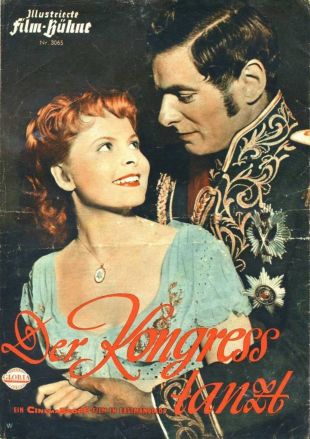Der Kongress Tanzt was one of the most ambitious and successful historical romances of its era, and marked one of the most serious attempts by Germany's Ufa Studios to compete with Hollywood on its own terms -- that it didn't make a lasting impact had more to do with political and cultural events in Germany than any shortcoming in this particular movie. Two of the lead players, Lilian Harvey and Conrad Veidt, were popular with both English- and German-speaking audiences, and Harvey was in the French version as well. And there was still enough awareness of the events dramatized in the film so that the movie had a natural audience, at least in Europe. But the real joy, and the lasting delight of Der Kongress Tanzt, lies in Erik Charell's direction -- in contrast to most filmmakers of the era, who felt compelled to keep their points-of-view stationary, the camera here is constantly in motion, in tandem with the soundtrack (itself more fully laden with music than most pictures of its era). And there is an extended travel scene, set to music near the end of the first hour, that is among the most beautifully conceived and edited montage sequences of its era, reminiscent of the best work of the tail-end of the silent period and incorporating some good lessons of the early talkie era -- in fact, in this section of the movie, and at a few other select points, Charell's work approaches the flow and beauty otherwise found only in the work of filmmakers such as Rouben Mamoulian(specifically Love Me Tonight). The unfortunate aspect of appreciating Der Kongress Tanzt today, alas, concerns its age. The only extant sources are somewhat dark and faded, with the English titles difficult to read and some interior scenes too poorly lit in current transfers (circa 2011) to be enjoyed properly, especially given the opulence of its sets and costumes; at other times, the details tend to get lost in what is obviously worn film stock, at least on the prints seen in recent decades. And these factors comprise a double curse for this particular movie -- a production of Erich Pommer, Der Kongress Tanzt anticipates the lavish historical romance/dramas in which Alexander Korda would come to specialize later in the 1930s. On any of those counts, it's worth seeing as a curio, though if a major, serious restoration were possible, this film could be more than a conversation piece.

Congress Dances (1931)
Directed by Erik Charell / Eric Charell
Share on